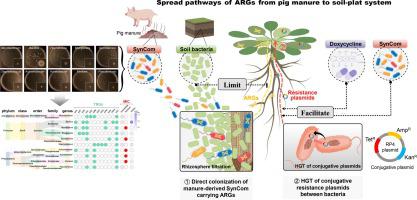当前位置:
X-MOL 学术
›
Environ. Int.
›
论文详情
Our official English website, www.x-mol.net, welcomes your feedback! (Note: you will need to create a separate account there.)
Priority establishment of soil bacteria in rhizosphere limited the spread of tetracycline resistance genes from pig manure to soil-plant systems based on synthetic communities approach
Environment International ( IF 11.8 ) Pub Date : 2024-05-09 , DOI: 10.1016/j.envint.2024.108732 Xin Wen , Jiaojiao Xu , Anja Worrich , Xianghui Li , Xingyun Yuan , Baohua Ma , Yongde Zou , Yan Wang , Xindi Liao , Yinbao Wu
Environment International ( IF 11.8 ) Pub Date : 2024-05-09 , DOI: 10.1016/j.envint.2024.108732 Xin Wen , Jiaojiao Xu , Anja Worrich , Xianghui Li , Xingyun Yuan , Baohua Ma , Yongde Zou , Yan Wang , Xindi Liao , Yinbao Wu

|
The spread of antibiotic resistance genes (ARGs) in agroecosystems through the application of animal manure is a global threat to human and environmental health. However, the adaptability and colonization ability of animal manure-derived bacteria determine the spread pathways of ARG in agroecosystems, which have rarely been studied. Here, we performed an invasion experiment by creating a synthetic communities (SynCom) with ten isolates from pig manure and followed its assembly during gnotobiotic cultivation of a soil- () system. We found that Firmicutes in the SynCom were efficiently filtered out in the rhizosphere, thereby limiting the entry of tetracycline resistance genes (TRGs) into the plant. However, Proteobacteria and Actinobacteria in the SynCom were able to establish in all compartments of the soil–plant system thereby spreading TRGs from manure to soil and plant. The presence of native soil bacteria prevented the establishment of manure-borne bacteria and effectively reduced the spread of TRGs. and were the main vectors for the entry of A into plants. Furthermore, doxycycline stress promoted the horizontal gene transfer (HGT) of the conjugative resistance plasmid RP4 within the SynCom in by upregulating the expression of HGT-related mRNAs. Therefore, this study provides evidence for the dissemination pathways of ARGs in agricultural systems through the invasion of manure-derived bacteria and HGT by conjugative resistance plasmids and demonstrates that the priority establishment of soil bacteria in the rhizosphere limited the spread of TRGs from pig manure to soil-plant systems.
中文翻译:

基于合成群落方法,根际土壤细菌的优先建立限制了四环素抗性基因从猪粪到土壤-植物系统的传播
抗生素抗性基因(ARG)通过动物粪便在农业生态系统中传播,对人类和环境健康构成全球性威胁。然而,动物粪便来源细菌的适应性和定殖能力决定了ARG在农业生态系统中的传播途径,而这一点却很少被研究。在这里,我们进行了一项入侵实验,通过从猪粪中分离出 10 种菌株创建了一个合成群落 (SynCom),并在土壤 () 系统的知生菌培养过程中跟踪其组装情况。我们发现 SynCom 中的厚壁菌门在根际被有效过滤掉,从而限制了四环素抗性基因 (TRG) 进入植物。然而,SynCom 中的变形菌和放线菌能够在土壤-植物系统的所有隔室中建立,从而将 TRG 从粪便传播到土壤和植物。原生土壤细菌的存在阻止了粪便传播细菌的形成,并有效减少了 TRG 的传播。和 是A进入植物的主要载体。此外,多西环素应激通过上调HGT相关mRNA的表达,促进SynCom内接合抗性质粒RP4的水平基因转移(HGT)。因此,本研究为ARGs在农业系统中通过结合抗性质粒入侵粪便来源的细菌和HGT的传播途径提供了证据,并证明根际土壤细菌的优先建立限制了TRGs从猪粪到土壤的传播。土壤-植物系统。
更新日期:2024-05-09
中文翻译:

基于合成群落方法,根际土壤细菌的优先建立限制了四环素抗性基因从猪粪到土壤-植物系统的传播
抗生素抗性基因(ARG)通过动物粪便在农业生态系统中传播,对人类和环境健康构成全球性威胁。然而,动物粪便来源细菌的适应性和定殖能力决定了ARG在农业生态系统中的传播途径,而这一点却很少被研究。在这里,我们进行了一项入侵实验,通过从猪粪中分离出 10 种菌株创建了一个合成群落 (SynCom),并在土壤 () 系统的知生菌培养过程中跟踪其组装情况。我们发现 SynCom 中的厚壁菌门在根际被有效过滤掉,从而限制了四环素抗性基因 (TRG) 进入植物。然而,SynCom 中的变形菌和放线菌能够在土壤-植物系统的所有隔室中建立,从而将 TRG 从粪便传播到土壤和植物。原生土壤细菌的存在阻止了粪便传播细菌的形成,并有效减少了 TRG 的传播。和 是A进入植物的主要载体。此外,多西环素应激通过上调HGT相关mRNA的表达,促进SynCom内接合抗性质粒RP4的水平基因转移(HGT)。因此,本研究为ARGs在农业系统中通过结合抗性质粒入侵粪便来源的细菌和HGT的传播途径提供了证据,并证明根际土壤细菌的优先建立限制了TRGs从猪粪到土壤的传播。土壤-植物系统。






























 京公网安备 11010802027423号
京公网安备 11010802027423号